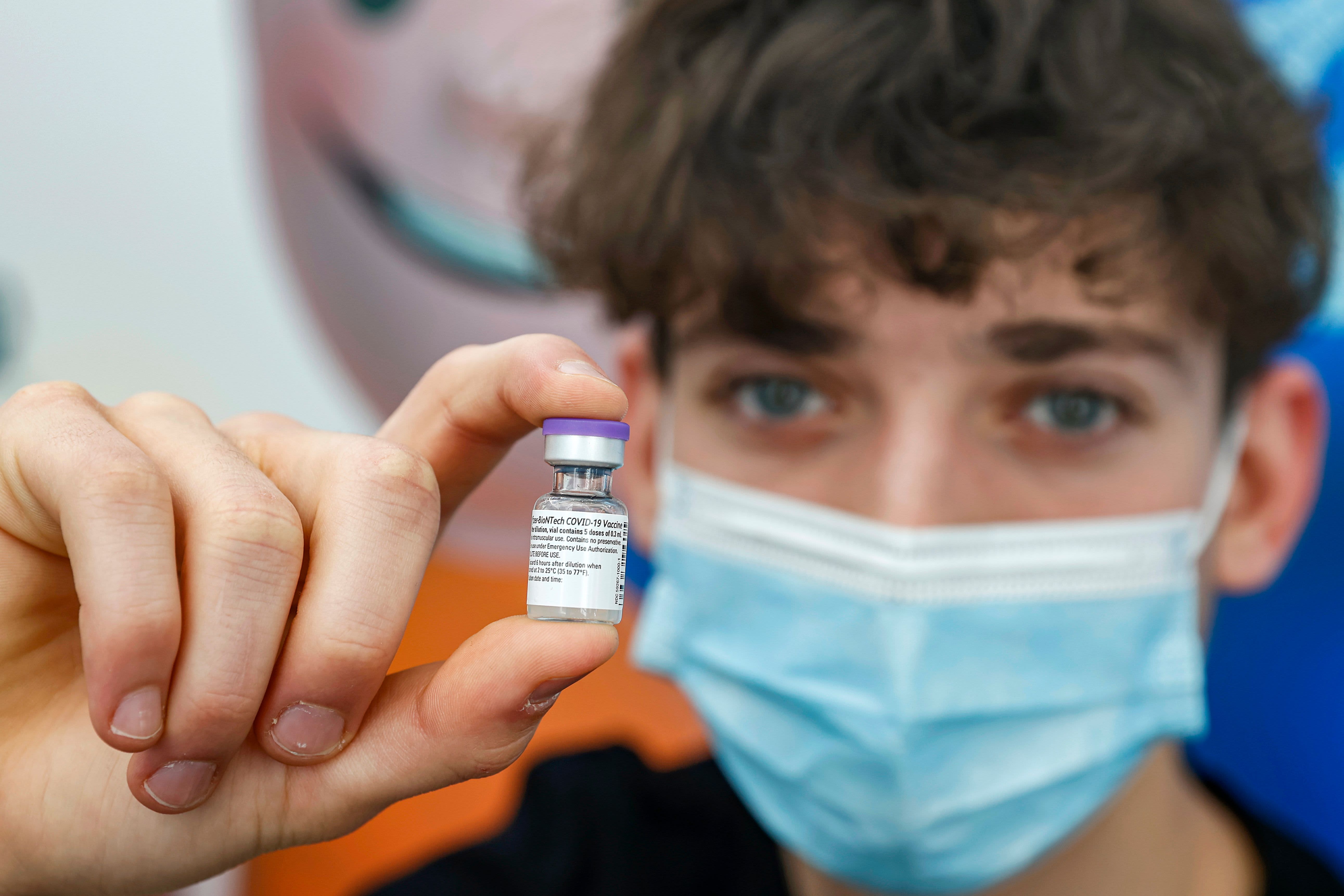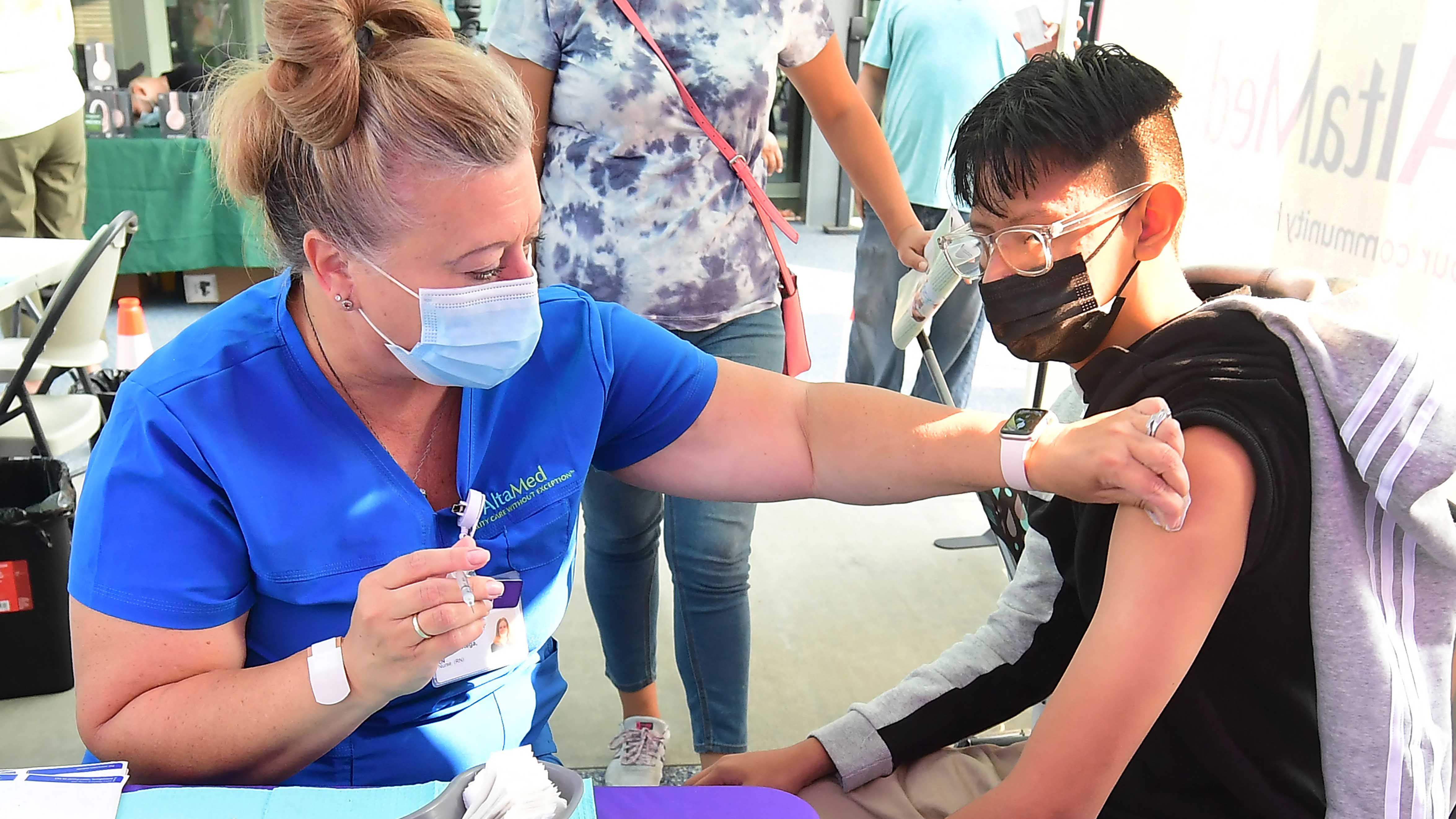One of Pennsylvania's largest health systems has run out of beds because of the latest COVID-19 surge, with doctors and nurses practicing “waiting room medicine” on patients who are forced to endure 10- to 20-hour delays in the emergency department, officials said Wednesday.
Geisinger is running at 110% capacity across its nine hospitals in central and northeastern Pennsylvania — overrun with largely unvaccinated COVID-19 patients who represent a quarter to well over half of all admissions, said Dr. Jaewon Ryu, Geisinger's president and chief executive officer. He said he expects the situation to deteriorate further in coming weeks, citing sharply rising numbers of cases and the increasing percentage of tests coming back positive.
“COVID continues to rage on,” said Ryu, stressing the urgent need for vaccination.
Resources at hospital systems in the greater Philadelphia region are also strained amid the latest surge. At Lehigh Valley Health Network, hospitalizations are up 43% in the last month and officials are warning the public to take caution.
Get Philly local news, weather forecasts, sports and entertainment stories to your inbox. Sign up for NBC Philadelphia newsletters.
"The current number of hospitalizations is the highest we’ve seen since delta became the dominant variant locally at the beginning of July," said Dr. Alex Benjamin, chief infection control and prevention officer at Lehigh Valley Health.
The rise in cases extends beyond Pennsylvania's borders, with healthcare systems in New Jersey and Delaware also seeing surges inside their hospitals. In Delaware, the state's largest healthcare system announced Wednesday that it would postpone elective surgeries.
"New COVID positive cases are rising sharply in the community, especially in the past weeks following the Thanksgiving holiday. This surge combined with already high demand for hospital services unrelated to COVID-19 is creating an extraordinarily high volume of patients who need hospital and emergency care," ChristianaCare said in a statement. "In order to meet the needs of our community and the demand for hospital beds at this time, we are taking the step to temporarily postpone surgeries and procedures that are not time-sensitive and that would impact inpatient bed availability. We are working closely with our physician community to determine which surgeries and procedures can be safely delayed, as we also work closely with our patients who will be impacted."
In Pennsylvania, an average of 3,900 people per day have been hospitalized with COVID-19 over the past two weeks, up 50% in a month, according to the Pennsylvania Department of Health. About 13% of the state's adult ICU beds and 10% of its medical-surgical beds are available, the health department said.
"Hospitals statewide are strained and many are at or approaching capacity," with extended ER wait times, said Liam Migdail, spokesperson for the Hospital and Healthsystem Association of Pennsylvania, a trade organization.
In addition to the COVID-19 surge, Migdail said, hospitals are seeing more patients who had deferred routine care earlier in the pandemic.
“This is all compounded by a staffing crisis that has significantly intensified over the past year as more clinicians and support staff leave their positions due to burnout and fatigue,” he said.
Bethlehem-based St. Luke’s University Health Network on Wednesday restricted visitation to two per patient — with COVID-19 patients not permitted any visitors unless they are nearing death — after reporting a “dramatic, ongoing surge in COVID-19 cases." St. Luke's reported 220 pandemic patients at its 14 campuses, nearly identical to the number of COVID-19 patients it was treating at this time last year.
“The current surge, largely driven by the unvaccinated population, is placing an enormous burden on our region’s health care system,” said Dr. Jeffrey Jahre, St. Luke’s vice president of medical and academic affairs.
Pittsburgh-based UPMC, Pennsylvania’s largest health network, said its COVID-19 census has been going up rapidly since early November. In addition to the rising virus patient count, UPMC hospitals are seeing more patients who had put off care. Dr. John Goldman, a UPMC infectious diseases specialist, expects to see more influenza patients after there were almost no flu cases last year
“We’re very full,” he said.
At Geisinger hospitals, the latest coronavirus surge means ambulances are backed up, ER doctors have resorted to making rounds in waiting rooms to diagnose patients with perforated bowels and other serious ailments, and COVID-19 patients are getting oxygen in crowded hallways, said Geisinger's Dr. Essie Reed.
“We’re almost two years into this, and it still feels like every day is a crisis when we go to work,” said Reed, an emergency physician at Geisinger Wyoming Valley Medical Center in Wilkes-Barre and Geisinger’s director of EMS. “It’s probably worse than it was last year.”
She said she recently took care of a young, unvaccinated married couple who both died of COVID-19 after refusing the “proven therapies” offered by Geisinger.
“We want to make these stories come to an end,” said Reed, begging people to get their coronavirus shots “so we’re not taking our turns crying in the med closet over unnecessarily watching patients die."
Ryu, the Geisinger CEO, displayed a line graph that showed the explosive trajectory of Geisinger's in-patient COVID-19 population. It was similar to last winter's trajectory — yet the current numbers are even higher than they were a year ago.
One day last week, all but one of the patients admitted to Geisinger Jersey Shore Hospital in Lycoming County were there to be treated for COVID-19, he said.
“What we’re going through here is largely preventable,” Ryu said.
About 90% of Geisinger’s COVID-19 patients are unvaccinated, and another 8% got their shots more than six months ago.



